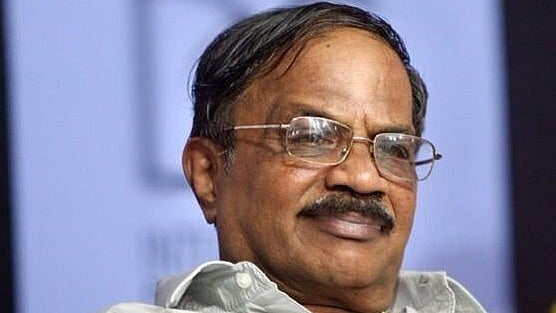
M T Vasudevan Nair.
Credit: X/@swaroopkaimal
On December 25, 2024, one of the most influential and celebrated figures of post-independent India M T Vasudevan Nair passed away. No eulogy can do justice to his oeuvre. His contribution to the arts is peerless. Sample this: His first novel was published when he was 23, which won him the Kerala Sahitya Akademi Award in 1958. Most recently, nine of his short stories were adapted to produce an anthology TV series Manorathangal (2024). That’s nearly a seven-decade of holding sway over his audience.
Conferred with the Padma Bhushan (2005) and Kerala Jyothi (2022), among many honours, Nair holds a distinguished record for winning the most (four) National Film Awards for Best Screenplay. His works signalled a unique love for the hyperlocal. The locus of his inspiration was the most accessible part of his life—his lived experiences and his immediate environment, which is why readers were often compelled to view themselves in his works. And this is the very reason many will take his passing as personal; a loss that will make them turn to his literature
and movies.
The uninitiated can perhaps pick the latest translation of his literary works by Gita Krishnankutty, Bear with Me, Amma: Memoirs of M T Vasudevan Nair, which particularly reflects Nair’s trademark prose. Furthermore, what’s mesmerising about Bear with Me, Amma is its interplay between the real and the fictive, a characteristic feature of Nair’s literary output. Divided into two parts: ‘Memoirs’ and ‘Stories’, the book consists of 18 literary pieces, offering a sneak peek into the Nair family faced with difficulties and a woman—his mother—coming to everyone’s rescue in these situations, approaching them with her modern sensibilities and thinking, which were significantly at odds with the place and her time. No wonder she had an immense impact on Nair’s life.
In Kozhikode, the city where Nair breathed his last, at the 2024 Kerala Literature Festival—the first edition since Kozhikode’s recognition as India’s first City of Literature by UNESCO in October 2023, Nair delivered the keynote address. His presence exuded warmth, though the physical fragility was obvious given he was in his 90s. In the memorable and arguably his last interaction with Saurabh Sharma for DH, he shared what was crucial for him while telling a story and how his mother influenced his art forms. Excerpts:
Over the years, you must have witnessed the transition of Malayalam literature, along with its translation into English and other languages. What do you feel has significantly changed for the better?
I feel translation [as an exercise] has improved over time. Language evolves, that is for sure. Literature too undergoes changes in form and content; that is inevitable.
You have worked across mediums. What art form do you feel the closest to?
The short story is a medium very close to my heart. And so is the screenplay. I enjoy the process of writing for the screen, as it is challenging in a unique way.
Mothers do shape a child’s worldview. What do you feel you borrowed from your mother and how her influence in your life helped shape your works?
My mother was definitely one of the strongest influences in my life and upbringing. Being the youngest of four children, and a rather sickly child, I was very close to my mother. She was very caring. Strong, kind, compassionate, and always ready to help those in need. Her humane nature has left its mark on me [and my work].
The title of your book Bear with Me, Amma signals a hint of not only seeking your mother’s attention but also asking for her patience. It may be the case that it’s also a form of apology to tell stories as you recollect them from memory. In that regard, what do you have to say particularly about the title of your book?
The title was chosen so that one feels she is still there, in spirit. When you write about someone so close to you, it is natural to feel so.
In this age and time, people also fear—when they are writing fiction—that they might end up getting troubled if the characters they have developed tend to be stereotypical or caricatures of real-life figures. What do you feel about appropriation, in this regard, and what advice do you have for writers to be authentic in their art—be it fiction-writing or writing for the screen—to better shape their characters?
Whatever you write, there must be an element of honesty in it. As far as I am concerned, the seed of a story might stem from an experience or something one comes across. That source is real. It is honesty that will strike a chord with the reader, and help sustain the writer. One should never fake it.
(Saurabh Sharma is a Delhi-based writer)